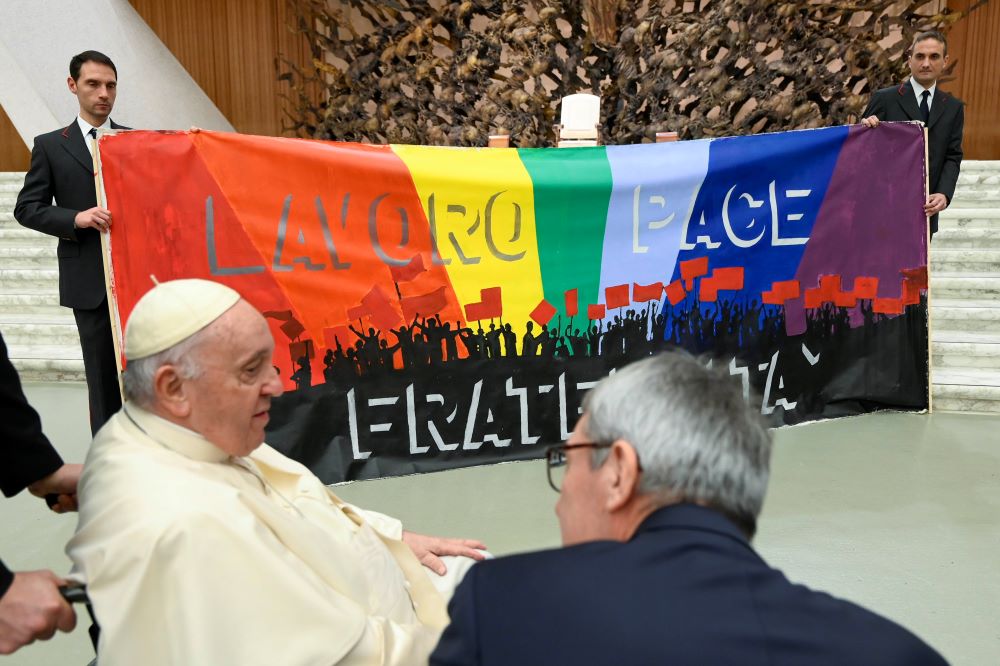
Pope Francis meets members of CGIL, Italy's largest labor union, during an audience at the Vatican Dec. 19, 2022. The banner in Italian says, "Work, Peace, Fraternity." (CNS/Vatican Media)
Labor has long been a central concern of Catholic social teaching. Starting with Rerum Novarum, the seminal encyclical of Catholic social teaching issued by Pope Leo XIII in 1891, through the current pontificate of Pope Francis, the role of work and rights of workers have been a focus of the papal magisterium and, consequently, of Catholic social ethics.
In 1981, however, St. Pope John Paul II issued his first social encyclical and labor was not a central part of it; labor was the focus of the entire document. Laborem exercens broke new ground in the church's reflection on labor by returning to the earliest sources in the Christian Scriptures. Instead of following the example of earlier popes whose social teaching was voiced almost exclusively in terms of natural law theory, John Paul II began with a reflection on the Book of Genesis.

Pope John Paul II smiles during a 1980 visit to Paris in this file photo. (OSV News/CPP/Giancarlo Giuliani)
By starting with the Bible, rather than natural law, the pope was able to address not only the objective nature of work, concern for just wages and the right to join a union, but also the subjective nature of work, and its intimate connection with our understanding of human dignity. He writes:
And so this "dominion" spoken of in the biblical text being meditated upon here refers not only to the objective dimension of work but at the same time introduces us to an understanding of its subjective dimension. Understood as a process whereby man and the human race subdue the earth, work corresponds to this basic biblical concept only when throughout the process man manifests himself and confirms himself as the one who "dominates". This dominion, in a certain sense, refers to the subjective dimension even more than to the objective one: this dimension conditions the very ethical nature of work. In fact there is no doubt that human work has an ethical value of its own, which clearly and directly remain linked to the fact that the one who carries it out is a person, a conscious and free subject, that is to say a subject that decides about himself (#6). (emphasis in original)
This is not merely about the right ordering of the economy. It is about the nature of humankind. The language about "domination" is off-putting because of the vast knowledge we humans have gained in the past 40 years about the ill effects on the climate from human domination. But no one should be put off by the point the pope is making: Work is intrinsic to human dignity.
John Paul II then connects the social teaching to what could be the central theme of all his magisterial teaching, the need to seek the dignity and destiny of the human person in the person of Jesus Christ:
[T]he one who, while being God, became like us in all things devoted most of the years of his life on earth to manual work at the carpenter's bench. This circumstance constitutes in itself the most eloquent "Gospel of work", showing that the basis for determining the value of human work is not primarily the kind of work being done but the fact that the one who is doing it is a person. The sources of the dignity of work are to be sought primarily in the subjective dimension, not in the objective one. (emphasis in original)
Although the pope does not specifically cite Gaudium et spes #22 here, its influence is obvious. That text states:
The truth is that only in the mystery of the incarnate Word does the mystery of man take on light. For Adam, the first man, was a figure of Him Who was to come, namely Christ the Lord. Christ, the final Adam, by the revelation of the mystery of the Father and His love, fully reveals man to man himself and makes his supreme calling clear.
Of all the citations to Vatican II in John Paul II's long pontificate, Gaudium et spes #22 was the most often cited.
This subjective understanding of work allowed John Paul II to level a distinct critique of capitalism and "the development of a onesidedly materialistic civilization." Such civilizations invert the proper understanding of work and human dignity, with the result that
there is a confusion or even a reversal of the order laid down from the beginning by the words of the Book of Genesis: man is treated as an instrument of production, whereas he-he alone, independently of the work he does-ought to be treated as the effective subject of work and its true maker and creator. (emphasis in original)

Members of United Mine Workers of America and other labor leaders bow in prayer while picketing July 28, 2021, outside BlackRock's headquarters in New York City as part of the union's strike at Warrior Met Coal Mine. (OSV News/Reuters/Brendan McDermid)
John Paul II examines some of the traditional concerns raised by earlier popes, especially the priority of labor over capital, the right to form unions and the ethical necessity of providing a just wage. But he keeps returning to the core source of ethical norms: By work, we participate in God's ongoing creative work in the world. Citing Gaudium et spes #34, John Paul wrote:
Awareness that man's work is a participation in God's activity ought to permeate, as the Council teaches, even "the most ordinary everyday activities. For, while providing the substance of life for themselves and their families, men and women are performing their activities in a way which appropriately benefits society. They can justly consider that by their labour they are unfolding the Creator's work, consulting the advantages of their brothers and sisters, and contributing by their personal industry to the realization in history of the divine plan" (#25). (emphasis in original)
Those who think of the church's social teaching as an add-on, something extrinsic, something that can be dispensed with or ignored, find in Laborem exercens an insuperable hurdle to any such dismissal.
Advertisement
In the coming years, nations everywhere will have to wrestle with labor issues. New challenges, such as those posed by artificial intelligence and proposals for a universal basic income, will require the church to cling to the precious connection between work and dignity. Old challenges, such as income inequality and migration, will continue to demand that the church highlights the priority of labor over capital. John Paul II's encyclical Laborem exercens pointed the church in the correct direction. It remains a fruitful guide.








